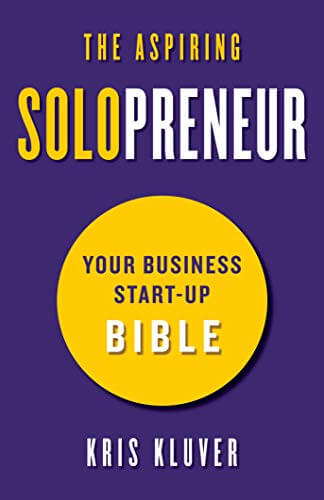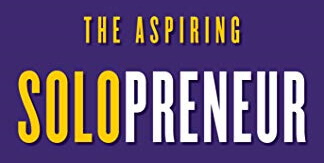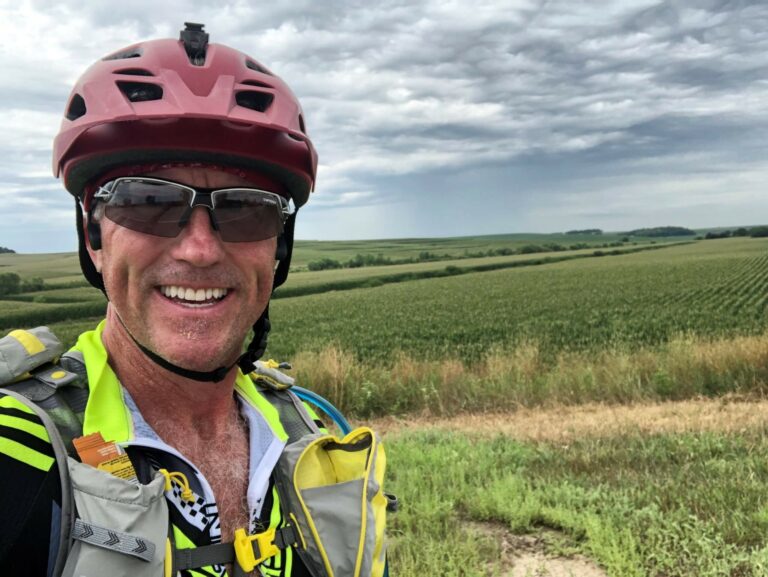
It’s never been easier to start your own business, but avoiding the many pitfalls can be a challenge. As a solopreneur, you need to think not only as an employee but also as an investor, manager, salesperson, bookkeeper and more.
Kris Kluver, the author of The Aspiring Solopreneur, is a seasoned entrepreneur, he has more than thirty years of experience, and he’s been involved with hundreds of businesses, ranging from consulting to real estate, online services, advertising, financial services and many more. He hopes to impart his love of solopreneurship to you so that you can achieve your dreams. So, if you’re thinking about opening a business, there’s no better time than now to make it happen.
Kris Kluver: In 2015, I needed to get a total hip and a total knee replacement. I didn’t have a big traumatic injury–I was in my late 40s and it was 100% a result of my own foolishness as a youngster. I owned it. It was a result of the sins of my youth, let’s put it that way.
So, with the surgeries, I found myself on the couch, stoned out of my gourd, not able to move and candidly, I suck at being immobile, I suck at downtime. I’m not good at that. So, I was trying to read, I would just sit there and read the same page three or four times and drool on myself and man it was awful.
I started watching television, which I don’t do a ton of. Through that process, I discovered what a Kardashian was, and it scared the pants off me. Then I ended up flipping over to these shows that showed these guys in Alaska and people living on the frontier. For some reason, I liked that–I liked the backcountry and that was really intriguing to me.
This one guy made less than $8,000 a year. If we treated our criminals like this, we’d go to jail. He’s got duct tape on his glasses and on his jacket. He drives a snow machine from the ’70s, but he can’t get through an episode without saying how fortunate he is, how grateful he is to live the life he has. Something really clicked in my head that made me realize that “Holy smokes, you know? We’ve completely lost control of the narrative of what success is. We’ve lost the idea of what success is on our terms.”
This guy, this hillbilly out in the woods, is owning it and he’s more successful than the really wealthy successful people I know, the Kardashians who appear to have everything in the world. They’ve got money, looks, fame, and all they do is sit around and bitch. Whereas this guy was looking at it differently. It really was a paradigm shift in my thinking. I really started to go deep into the rabbit hole, researching and studying the idea of helping and defining what success is, but on our terms.
Through that, I started to learn that there are so many opportunities for us as individuals and for people to go out and live their dreams. Dude, we live in the most abundant times ever, since the dawn of time, no matter what anybody says, things are getting better and better and better and better.
Humans are the only animals on the planet who look at the past with nothing but fondness and the future with nothing but trepidation, even though there’s nothing to suggest anything but the opposite. So, going through this, I started really researching and embracing it. I realized that my gift–I started my first of 14 companies when I was 19.
I have built them, bought them, sold them, advised hundreds of people on them, and I realized that that’s how I’m wired, but that most people aren’t. I started really digging into what that means. Through that, I realized that it’s my opinion that when you see people who want to go out and live life on their terms, they can. We can do anything we want right now–anything is possible. But we get in our own way.
When it comes to owning your own small business, it has never been easier to test it, to vet it, to start, and then slowly transition, so you thrive. But most businesses fail, and it makes me sick because the numbers would suggest that roughly 50% of all businesses that start fail within the first five years. That’s a train wreck.
That takes people’s lives, it takes their health, it takes relationships. All they’re looking for is they want freedom, they know there’s more out there, but they don’t know how to get it. Now, the scary thing to me is that of the 50% that make it, I would argue, another 50 to 70% of those are bumping along, succeeding despite themselves, because they are too stubborn to give in or they keep throwing money at the problem.
They aren’t thriving. It was through this whole process that I started realizing, “Man, you know, it doesn’t have to be that way and I know that because I’ve lived it. I’ve helped a lot of people with it.” That’s where I want to be able to help. I want to be able to change the trajectory of where people are, so they’re not just getting by.
Getting by sucks. I want people to thrive, that’s my objective, that’s the goal with all this.
From Surviving to Thriving
Charlie Hoehn: I’m curious, what did you uncover in your research on success on your own terms? There is this template that a lot of people unconsciously follow of if I get more success, more money or more fame, then, I will be happy in life or then I will have done life well.
Kris Kluver: It’s broken thinking to me. These are just my theories on this, but I believe that we’re the first generation in history, since the dawn of time, that doesn’t have to invest most of our energy in not dying. We’ve got unlimited water, we have almost unlimited power, we have issues absolutely, but for the most part, we aren’t worrying about starving or people coming over the hill and killing us or people coming over and stealing all our stuff.
Think about it, it’s been within the last three generations that’s happened. New generations never had the experience with world war, with mass famine, and for the most part, if you’re in this country, you are so insulated that you don’t see that. So, because of that, I think that our parents and our grandparents have been ill-equipped to help us think differently.
We’ve been totally wired for more, more, more, more, need, need, need, need, stuff, stuff, stuff, stuff. Because historically, somebody was going to steal all our shit, or we weren’t going to have enough. The fact is that we’re transitioning that thinking, but we’ve handed over our thinking to our parents, to our peers, to our advertising, but we haven’t taken control of ourselves.
That’s why I start in the book–with that very idea that you can determine what success looks like on your terms first and foremost. So, if you decide that means that I want to go to every one of my daughter’s ballet recitals–win!
If that means that you want to live in a simpler house, and you only want to work 20 hours a week, right on. If it means that you want to be famous or you want to make more, you can do those things. The challenge is that if we don’t know what we’re going for, there’s no way you’re going to get it.
Nobody goes on vacation and says all right, “Honey, let’s go on vacation,” then just goes and gets in the car and starts driving. “Well, do we have gas? Do we have any clothes? Do we have direction, do we have the kids? Do we have bags?”
But that’s the way most people live their life and it is just mind-boggling to me. If we can help people figure that out. The way that most people can live that life, whatever they choose, is through their own private business.
Charlie Hoehn: Could you define what a solopreneur is to the layman who maybe hasn’t heard that term?
Kris Kluver: I define solopreneur as an entrepreneur. In essence, this is somebody who wants to be in charge of their own life, control their own business and work, most likely, by themselves. They may contract with somebody to help them with their books or they may contract to get some help with their marketing or things like that.
In essence, it’s somebody who is kind of like a gig worker. They are truly accountable for who they choose to work with, when they choose to work, what they choose to do, and how they get compensated.
Success on Your Own Terms
Charlie Hoehn: How do we get to the place where we’re thriving and really achieving success on our own terms?
Kris Kluver: It would be my opinion that first, you have to define what success looks like for you. You have to define what your true north is, who you are in your soul, and then define where you’re going. You have to know crystal clear, but you may need some ideas.
On that note, for years, I owned a content marketing and social media management company where we worked with people from New York to Indonesia. I had a lot of younger people working for me and a lot of people say, “Oh, the millennials, they’re a bunch of slackers and they just whine. I don’t know why they’re entitled.” I would argue, I think that a lot of millennials are some of the hardest working generations we’ve ever had, if you provide a good why–if they know their why. If they know why they’re doing something and they buy into it, holy smokes, those guys will dig in like nobody’s business.
As a solopreneur, if you know what you want, if you know where you’re going, your true north of what matters to you, and then you define the next step of where you’re going, it’s going to help you get there.
In the majority of the cases, I would argue that almost never does a small business or solopreneur or gig worker fail because they aren’t great at being a technician in that business. If they’re a writer or an accountant or a therapist or whatever it may be.
Almost never do those people fail because they’re not good at actually performing the task. The reason that they fail is that they go in blindly, hoping that they can just go build a business. One of the key concepts in the book that I’m really pushing is to transition people’s thinking so that they can start to think more as an investor and that they’re investing in their business. What does that look like? What’s it going to take? Be honest, be pragmatic about it.
To think more as a manager, you’re going to have to manage yourself in the processes and actually make sure that the work gets done. You’re going to think of it as a business development person. Who is going to drive sales and success?
Then lastly, as the technician actually operating within the business. It’s those first three steps that if you suck at one of those, you could go right off the rails and not even realize it before you’re in trouble. But I promise that this is the most abundant time ever, it has never been easier. In the book, I go through a step-by-step process with lots of exercises about how people can actually go in and test this, and start building that, and how to create a full board of advisors that aren’t going to cost you any money–from peers in your network or peers in the industry, to finding a good banker, finding a good accountant, finding a good attorney, and finding a good insurance person. In some cases, they’re solopreneurs and their whole job is to make sure that people like you are successful.
How do we do that, and then how do we very intentionally figure out where we want to go? Build the plan, test it, research it, become an expert, so that then we can very safely and very intentionally transition so that we’re very, very successful when we go and launch.
Dude, yeah, you want to start a business, I get it. Let’s figure out how we’re going to do that, don’t just jump in the car and start driving because you’re going on vacation. Where are we going?
Charlie Hoehn: Tell us a bit about the stakes. What does it look like? What happens if, let’s say, a fitness trainer, somebody who is a solopreneur and starting a business, gets it wrong and doesn’t do what you prescribe in your book?
Kris Kluver: Well, if people choose not to do this–and unfortunately, most of the people who are thinking about it or dreaming about it won’t do anything. Then they’re going to become a victim and they’re going to be stuck in the doom loop of their job. I call that office hell. For those who choose to actually go out on their own and try and do it the best they can, the statistics say that 50% of those people will not fail. But 50% are going to fail.
The challenge is that you’re going to see that 50% failure rate about every five years. The problem is rarely are people going to thrive. What does that specifically look like? It looks like bankruptcy–it could look like divorce–the worst health impacts that you can imagine. If you think about the stresses associated with that, there are all sorts of negative things that can happen.
It could be beautiful, wonderful, and exciting when you get there, but that road from starting to getting into it, that’s a whole different set of skills than actually executing the task, the product or service that you’re selling.
Step by Step
Charlie Hoehn: Absolutely, Kris. So, let’s make this even more real. I’ll share a little bit of my story and my journey as a solopreneur.
Kris Kluver: Right on. Let’s see where it goes.
Charlie Hoehn: Cool. I’m an author myself and I’ve written a few books. One of which, not only did pretty well, it continues to create opportunities. My book was about how I went through burnout and a really hard period of overwhelm and stress and anxiety and how I tried everything for two years and nothing worked.
And then I started adding play back into my life, like the way kids play because kids and teenagers have stressful existences too. But they play as a release valve and as soon I started doing that, within less than a month, I was completely symptom-free–totally back to normal.
I am at a point now where I am strongly considering doing group workshops, where it is just a day, maybe two-day, workshop where we practice these principles and it is group coaching. Now I’ll tell you I’ve experimented with little things in the past like courses and stuff and I have gotten by, but I fall into the category of somebody who’s been in business for a while but hasn’t really thrived.
So, what would you say based on your book? Do I need to define success on my terms first?
Kris Kluver: I so embrace and love your idea of play. I too work with high dollar leaders. I am an adviser to billion-dollar CEO’s. From solopreneurs to billion-dollar CEO’s, and I have a lot of $100 million leadership teams I work with, but I get a little wrapped around the axel sometimes about how important I am. I actually am at the point now where my wife paints my toenails and buys me superhero underwear just to remind me. I am not kidding.
For you, I think the most important thing is to start to really define what great looks like. If you know where you want to go and you can have a visualization of what spectacular looks like for you in three to five years, dude, you’re halfway there. Have it crystal clear what those retreats look like, how many you’re doing–are they adventure-based, are they overseas, or are they local? Is it in Bailey, is it up in Vale, what are those things that really, really float your boat?
Define that and I firmly believe that the universe will line up and give you exactly what you want, but we have to know what we want. If I were in your shoes, I would start with defining crystal clear who you want to work with. The more you can say no, the more you can narrow it down to who specifically are the people you want to work with, you’re going to be able to be laser-focused on how you approach them and how you go after them. I talk about that in the marketing component of this.
If I were in your shoes, I would start with that. Then second, and this is recommended in the book, I would start finding out who your peers are in that space, or that are even kind in that space, and call them and say, “Hey dude, I would love to start doing workshops in this kind of space–doing this and this and this. If you were in my shoes, what would you do?” And then shut up.
Remember, the good Lord gave you two ears and one mouth. There are lists of questions that I ask people but start out with other people in your industry. In your case, it is not like people across the street do what you do, but there are people that do retreats all over the country. Start finding those people and ask them what worked for them and what didn’t.
We get our own way. So, on that note Charlie, I believe that extraordinary lives in the unreasonable. Fucking be unreasonable, dude. Go out and get it and dream big and go ask those people and if somebody says no, well maybe they are scarcity-minded. Let them go–there are a lot of people out there who can help you. Keep asking, and you may find people that say, “You know, I love that idea. Would you want to do one with me?” But again, that’s what’s going to get that started for you.
Charlie Hoehn: It gives me a sense of relief, because I know I can lean on others and start at a crawl and then walk and then run.
Kris Kluver: Then they’re going to open up so many doors. They’re going to open up doors about who you should talk to from a financial basis. They are going to open up doors about who you should talk to for potential networking, the types of structures you should do, the type of insurance–all those things. But it is a matter of being curious and listening. To that extent, I don’t care who you are. You can’t do everything on the planet well, no matter who you think you are.
Some people could do a lot of it and that is awesome, but those people get in their own way more than anything. I would encourage you to think of yourself as the composer and the conductor of a symphony. You may be a virtuoso who can play every instrument, but you know what dude? You can’t play every instrument at the same time. It’s your job to figure out what the music is, what it is going to look like, what the flow is going to be, and then you coordinate that flow.
It could be through some of your contractors, it could be through a lot of what you do, but that’s where, as the manager, you have to manage that process. You can’t do it all. There are some tools that I created called the delegation matrix and some other tools to help people define what those things are that they can let go of. What is going to be the highest and best use of your time, where you get the most value, the most juice for the squeeze?
Swing at the Good Pitches
Charlie Hoehn: Tell me more about some of the big ideas in your book, or maybe something that might surprise a listener that they’d find in your book to help them in their path towards becoming a thriving solopreneur?
Kris Kluver: Two things–one is in many cases I am going to encourage people to be very, very open and candid with themselves. Have that deep conversation about whether this is the right fit because I consider it just as big of a success if somebody reviews it, digs in, looks at it and says, “Wow, this is not a good idea. I shouldn’t do this.”
The education, the paradigm shift that somebody has gone through when they are thinking is awesome. It means that, holy smokes, they’re realizing that this isn’t the right fit. Maybe they are not wired for it or maybe it is just this opportunity, but what that says to me is that, “Boom, we just saved somebody who wasn’t going to be in that 50%. We just saved somebody who is going to lose their entire life savings, or who is going to get divorced, or who is going to end up in the hospital because of stress.” To me, that is massive.
That’s the first thing and the second thing is along that same lone. As people go through this, they may think that their original version of what they thought success was going to be for them, and for the business they wanted to start, that was their one shot. It’s like, “Oh god, I have got to make this work, or I am never going to get there. I have got to do this.”
That is not the case. I am going to beg and plead with them not to believe that. I literally have gone through this entire process that I teach hundreds of times, and 90% of the businesses that I thought were spectacular–that I thought were just brilliant–were bad, or it was close, but it wasn’t a great fit. With that in mind, I want these things to be total no brainers for people. I want it to be that when they do this it’s like, “Oh my god, this is what we should be doing.” Then you know it’s a good fit.
If it is close, but it’s like, “Nah, it’s not quite right,” don’t worry about it. You’ve turned on all sorts of new switches in your brain and you are going to start to see opportunities all over the place. It is through that you are going to end up finding out what’s really lights you up, what really turns your crank.
Being in Omaha, I’m a shareholder in Berkshire Hathaway, which is Warren Buffett’s company. They do big shareholder meetings that they call the Woodstock of Capitalism, and I go to that every year. Warren Buffett’s number two, his name is Charlie Munger, and Charlie, in my opinion, is just as smart as Warren and just as big a deal. He’s a little bit older, and he’s kind of a curmudgeon and gruff. I love that. He’s very, very blunt.
At one point, listening to Charlie talk in the stadium where they do their shareholder’s conference, he said, and I quote this in the book, “People think that we are really brilliant. That we’re some kind of soothsayers or gurus, we’re not. We read a lot of stuff. We look at a lot of deals. When we get a good deal, we look at it, we research it, it’s like, ‘Huh, it’s a good deal,’ you know what? We do those deals. We only do no brainers.”
I know that sounds really basic, but the problem is that when somebody who is really smart wants to start their own business, they can rationalize their way into anything.
Just because they can, doesn’t mean they should. The intention is, is it a no brainer? It’s like, “Oh my god, I love this. This is going to be a home run. This is going to be awesome. I don’t know everything yet and I might get clobbered here and there, fair enough, but for the most part yeah, I got this.” That is where we want to get to.
Charlie Hoehn: In the HBO documentary about Warren Buffet, he talks about how his investment strategy is similar to Ted Williams hitting strategy. Ted Williams is still widely considered the greatest baseball hitter of all time and Ted Williams whole strategy was–don’t swing at bad pitches. Swing at good pitches and nothing else.
Kris Kluver: And that’s it. So often people think, “Oh my god, this is my one chance to get, this is my one shot.” And it is so not true. It is the first time that maybe they’ve looked at it, but if they go out swinging because they are swinging at bad pitches, they’re going to be burned. They may never ever, ever want to go out again. The problem was they just swung at the wrong pitch, but nothing out there teaches us how to research.
What is a good pitch? What is a good fit? How to build a pro forma? How does this have any financial viability? Are we taking into account how much the government is going to take, how much it costs for taxes, for insurance, for our suppliers? Have you factored that? No, people are just, “Okay, we’re just going to get in the car and drive–we’re on vacation.” Okay, where are we going?
Shifting Definition of Success
Charlie Hoehn: You force the reader to really ask themselves the tough questions to make sure they are going down the right path.
Kris Kluver: I hope that is the case. Going back to the idea of millennials, it is about asking the right questions. I think we are in a paradigm shift about how we look at what success is. I grew up going to school in the 80s and 90s, where it was about how much Pabst Blue Ribbon and cheap bourbon could you drink. It was debauchery. It was the era of cocaine and big hair and things like that.
Now it is tiny houses, and twenty-hour work weeks, and craft beer, and adventure. I think it is a different definition of success, and it can be on your terms. You know for me and my wife, after I went through my hip and my knee replacement, we went through and really defined what success is for us. It is different for most people. We met in Chile traveling and we love to adventure travel.
We also love doing what we do. We feel like the luckiest, most fortunate people on the planet, man. Now, we very intentionally designed and built our lives so that we take three months off a year doing adventure travel, and we get to work with people we love and help them. And candidly, we’re making more money than we ever have. I am in the best health and physical fitness I have ever been in, because I made that a priority. Since the hip and knee replacement, I have lost close to 100 pounds. I was able to complete two ultra-marathon trail runs this year. So, it’s absolutely ridiculous what is possible when you start putting intention behind it and defining what you really want.
A Personal Example
Charlie Hoehn: Can you tell a story of somebody who’s gotten a lot of the ideas in your book and how it transformed them? What their life was like before, how you came in and helped them, and what their life was like after?
Kris Kluver: My wife was an accountant for a venture capital firm in London, and she was good at it, but she didn’t really love it. It was okay. In her particular case, she ended up completely transitioning to a different career, but it was over a long period of time. It was a long journey. Through the process, she ended up finding that she really wanted to be a couples and family counselor. Counseling had helped her, and it helped us. It helped her with some of the challenges she had when she was young, and it was really important to her.
She ended up going back to school and we had to figure that out. Then she ended up getting her degree and then she basically had to work for 3,000 hours under somebody else. So, she did and then she decided to go out on her own. She’s a very smart person.
She had a background in accounting with a venture capital firm. She had a master’s degree in couples and family counseling, but there was nothing out there that had taught her how to actually start her own practice. There was nothing out there. We went through and slowly built her whole model. She vetted it, and we built a plan for her to transition.
Long story short is that she now makes about twice the money she did as an accountant, working about twenty hours a week. She’s an ultra-athlete, so she does a fair amount of training, and has the time to do that, and she loves her life. She gets to help people in ways that are really fulfilling. She is choosing to even move on forward and she is starting to look at couple’s coaching and individual life coaching and things of that nature. It is really exciting to see, to have a front-row seat and see how that has gone.
Charlie Hoehn: What is the best way for listeners to either follow you on your journey or potentially connect with you if they are running a business, they want to get your input, that sort of thing?
Kris Kluver: On that note, I am more than happy to help people in any way that I can, and I encourage people to please reach out. I will get back to you as soon as I can. I really am wicked about managing my time, but I do try and follow up on all my emails. The primary place they can find me is on my website, which is aspiringsolopreneur.com. My wife and I also have a YouTube channel called solopreneur-life.com where we talk about some of the couples retreat stuff we do, but mostly it is a place intended to celebrate the life of a solopreneur. Then the third place is LinkedIn, and feel free to connect with me there. I have a couple of other social platforms, but candidly, I am not that active on them anymore.
A Challenge from Kris Kluver
Charlie Hoehn: The final question I have for you is to give our listeners a challenge. What is one thing that they can do from your book that will have a positive impact on their life or their business this week?
Kris Kluver: Go to The Aspiring Solopreneur, and there is a free video that talks about identifying your LCG–your life-changing goal. It’s an exercise that takes you through two steps, and that shouldn’t take more than 20 minutes, that will help you dig down and define what is that thing that is just extraordinary in your life? What is that thing that’s like, “Holy smokes, I have been dreaming about that forever, but I didn’t realize it.” It will help you define where is it you want to go and how you’re going to get there.





